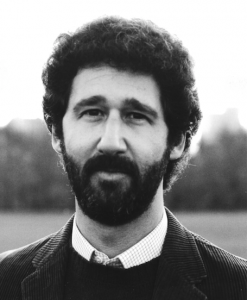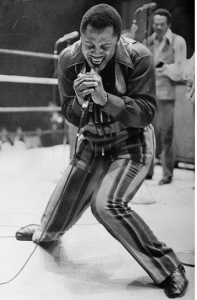Sparring with Smokin’ Joe book offers deep look into Joe Frazier, no mere foil for Ali

It was almost 50 years ago to the day that Muhammad Ali and Joe Frazier engaged in “the Fight of the Century.” And most of the time, when an event is marketed with that sort of majesterial wording, you’d want to adjust your expectations accordingly, and understanding that boxing is a sports entertainment business, and salesmanship tactics sometimes veer towards excess.
But this tag has stood up over time, and cannot be dismissed as an exercise in breathless over-hype. That has to to with the lasting cultural import of Ali, whose magnetism was of such a caliber that it’s a safe bet that the world will never again see the likes of such a sportsman. Because he wasn’t merely an athlete; he was a religious icon, a racial and civil rights authority, a sex symbol, and we could keep on adding etcs.
Ali is deservedly revered and his legend will only grow in the coming decades, because the gap between his glowing persona and trait set, and everyone else’s is so immense, that people will continue to marvel at the gulf. But Ali needed his foils, be they institutions, actions or persons— and at the end of time, one man will be regarded as the most potent juxtaposition symbol for The Greatest.
Joe Frazier, Smokin’ Joe, offered considerable contrasts to his rival for the ages, and for that reason, the March 8, 1971 face-off at Madison Square Garden will be celebrated again, in another 50 years. That fight gets extra and deserved attention because Frazier lifts it to the next level.
More attention will be paid to Ali in the coming days as we move to the anniversary, because that’s how this all works, his celebrity is of a certain level as compared to Fraziers.’ So I welcomed, especially, the release of a new book by Glenn Lewis, director of journalism and professor of English at York College in New York, which gives Frazier top billing and stage time.
“Sparring With Smoking Joe,” from Rowman & Littlefield, is the result of the veteran journalist, who has written about sports, health, business, education and societal trends in Sport, Car & Driver, Seventeen and the Philadelphia Inquirer, spending time with Frazier over several months way back in 1980. He hung with Joe, AM to PM, and got a pretty total immersion into how his day would go and how his mind worked.

The Frazier that Lewis experienced was “just” 36, but he’d hung up the gloves in 1976, after being stopped by George Foreman. On June 15, 1976, Foreman finished off Frazier in round five of their bout in New York. Foreman had beaten down Frazier in their first meeting, in 1973. Before the second Frazier match, Frazier had faced off with his mega rival in Manila, and stayed on his stool after 14 rounds. So when the author parachuted into the world of Frazier, Joe still wrestled with his transition from being active fighter, to being more so a full time father, and also a trainer, to son Marvis. The ex boxer tried to fill the vacuum by trying to build up a singing career, but he couldn’t help himself…he would service the itch to compete, one more time, and lace up the mitts again, in December of 1981. A draw with Jumbo Cummings proved to be a nail shutter, he resisted any further temptation to give it one more go.
Lewis in his book brings you into the thought processing of the Philadelphia Hall of Famer, and the author was kind enough to take some queries from me about the project.
Q) The research for this book started in 1980…But the book took a bit of time to get here. Can you explain the gap, flesh that out a bit?
A) My agent originally thought of this as a made-for-TV movie in the 1990s but Joe was coming out with his autobiography, and we decided we didn’t want to compete. Later on, when Joe was ill, I didn’t want to look like I was cashing in on his misfortunes. Then, when Ali died, there was a huge rush of books coming out and I didn’t want to get lost in the crowd. So I eventually decided to aim toward the 50th anniversary of the Fight of the Century, Joe’s biggest victory.

The author of that caption deserves a demerit for lack of forethought. The legend of Ali, and his rival/foil Joe Frazier will endure into the next century, at least.
Q) So, congratulations, the book is No. 1 in new boxing releases. How did that make you feel, after this long labor of love…Sufficient payoff for the toil?
A) Not really! The payoff here is the way readers have reacted to the storytelling and writing style and for the starred review that called it “Maileresque.”
Q) Can you tell readers how and why you decided to do this effort? Had you always been a Frazier fan, and wanted to tell his tale the “right” way, finally?
A) Again, not really. I was always an Ali fan and rooted for him to destroy Frazier in that first battle, the Fight of the Century, and the two that followed. In 1971, quite a few years before interviewing him, I was one of those draft-age kids who admired Ali for his skill in the ring and his outspoken position against the Vietnam War. I didn’t have a feeling for Joe as a person until I actually met him and spent time with him. Then, the more time I spent with him, the more I started to admire his honest, straightforward manner, his homespun humor, and his resilience in handling all that public life and the pressures of great fame and the Ali rivalry created.
Q) Was the mission of the book the same from start to finish, or did it change while you did the writing?
A) The reporting for the book took several months back in 1980. As the reporting moved along, the better I got to know Joe and the people around him. Part of the mission was to allow the reader to get to know Joe as the book progressed right along with me. I wanted the reader’s relationship with Joe to grow organically, as if they were there spending time with him, so that my initial awkward relationship with Joe and his inner circle turned into a somewhat comfortable friendship for both me and the reader.
Q) Some things that struck me in this fine piece of reporting and writing….Joe and his relationship with son Marvis. Did you come to the project with a notion of how he’d be as a dad, and did that match up? And we writers work through our own filter, which can warp, or at least influence our take. Did that happen to you with this book, that you noticed?

The author possessed all pepper, no salt, when he went sidecar with Frazier in 1980.
A) I assumed that Joe would be Marvis’s ideal and role model—and not much more than that. However, what surprised me was the reminder that Joe was only 16 when Marvis was born, and both constantly referenced how they were part father and son and part big and little brother. There was a mischievous type of camaraderie that existed between the two. In some ways they seemed closer than other famous fathers and sons I had seen. This unusual relationship allowed Marvis to greatly admire Joe for his accomplishments but also to be able to question his beliefs and advice in a way that was unexpected. Marvis was constantly reevaluating Joe’s boxing advice in light of what his trainer, George Benton, was preaching. Benton’s preferred style for Marvis in the ring was pretty much the opposite of what Joe was telling him to do. Joe wanted Marvis on the attack, moving forward, in close, in Smokin’ Joe mode, where Benton knew that the taller, more agile Marvis wouldn’t need to take as much punishment working more from the outside. Marvis seemed to instinctively know that Benton was right, but in the heat of the moment Joe’s words often found their way into Marvis’s ear. (Click here to learn more about Marvis.)
Q) I’d never delved into Joe’s singing side gig, aka The Smokin’ Joe Frazier Revue, so much. Great stuff! Did you have takeaways about the need for a certain personality to perform…in the ring, on the stage? And with Joe, how much was it of a need to push himself, and how much was it about craving adulation?
A) Joe saw himself as a natural entertainer whether in the ring or on the stage, and he expected a certain amount of adoration from both. What surprised me and to some degree Joe was how harshly some black audiences in Augusta, Georgia, that you would expect to be his greatest admirers treated him during his act. Many of them were still channeling Ali’s narrative from the Ali-Frazier wars. Ali had crowned himself the black man’s champion from the beginning and Joe as the disappointing white man’s champion.

In a ring, on a stage, a Frazier takes the risk of failing, in exchange for a payoff of adulation when the risk is overcome.
Q) You touched on some of Joe’s “conservative” viewpoints when you share his interaction with the female radio interviewer, who asked about women fighting. Joe said ladies belong in the kitchen, basically. A few times in the book, you admit you were taken aback by one of his stances….And not always in a ‘negative’ way. Like when Joe explained why he wasn’t put off by the ignoramus calling him “boy.” Frazier challenged your way of thinking, yes?
A) Joe not only challenged my way of thinking about a lot of things but also my assumption that I could read him, and the situations he was in, correctly. Perhaps one of the best examples is the conversation you referred to with the owner at the upscale nightclub in Augusta. The club owner seemed thrilled that Joe was considering playing at his club, yet throughout the conversation he referred to Joe as “boy.” I kept waiting for Joe to respond and lash out. Joe didn’t seem upset and calmly agreed to play the club and appeared pretty content with the way things had gone. However, by the time we left, I was fuming. I couldn’t understand how Joe just didn’t pounce on the guy for what he was saying. And that’s when Joe reminded me that I was the outsider here who was reading the situation all wrong. He noted that the way this guy grew up, there was nothing wrong in the language he was using. You have to remember that this was 1980 in the South. Joe said the owner was actually a pretty good guy who didn’t mean to offend him. That’s when I asked him if it would have been different if this had happened in New York or Philadelphia. “Yeah,” he said, “a guy like that should know better. I would’ve knocked him out.”
On another occasion when Joe was telling the interviewer at James Brown’s radio station that women belonged in the kitchen cooking for their husbands rather than in the boxing gym, training, I cringed. But then I noticed a twinkle in Joe’s eye and felt he was just playing us, that he was more aware what people expected of him than I realized and he would just play with the situation. And of course both he and Ali had daughters who went on to become very good professional boxers.

The author in a “now” picture. The beard is gone, salt replaces pepper up top…But the Frazier material probably got better served because the writer lived and learned and is now better able to see the foil Frazier from more angles.
Q) I enjoyed you picking up on how some whites interacted with Joe, saw him as “our champion.” Did doing this project lead you to look at Ali differently, because he was so effective in setting up the narrative that stood for so long?
A) The narrative of Ali as the black man’s champion and Joe as the white man’s champion seemed to be embraced by everyone to some degree. It made me realize even more how Ali had shaped not only his image but Joe’s image for years to come. It also made me realize that although Ali was still worthy of respect for many of the stances he had taken and the causes he had backed, he didn’t weigh the consequences of his words for someone he supposedly cared about, like his old friend Joe Frazier. So of course this project made me lose some respect for Ali because of the way he damaged Joe.
Q) Readers may want to be on the lookout for your anecdote about how Joe took the place of the waiter and warned the rude businessmen to be more respectful. It seemed like your take on how Joe chose moments to be an activist, of sorts, changed over time, yes?
A) Joe never seemed to consciously make the decision to be a black activist. He wasn’t the type of guy to have that kind of agenda. And he also vehemently disliked people putting words in his mouth. On the other hand, he responded instinctively; he would do what he thought was right at the moment. Sometimes his gestures could be more impactful than any scripted speech. That’s what happened at the luncheon with local businessmen in Augusta. He saw that some of them were being disrespectful to the young black waiters, and he chose to make a statement by taking the place of one of the waiters in serving a course and dared the businessman to treat him with the disrespect they were showing the waiters. Needless to say Joe’s gesture spoke volumes and made his point. It was one of those moments you don’t forget.
Q) I want to encourage all boxing fans to get this book–so I will stop giving spoilers. But I will finish up by asking this: Ideally, what do you want readers to come away with after reading this fine book?
A) I’d love to see readers come away with a better idea of how Joe was as a person and a clearer vision of how he related not only to friends and family but to the everyday person who felt entitled to walk up to him on the street. I also wanted to show readers there was a price to pay for Joe’s rivalry with Ali that went far beyond the ring.















